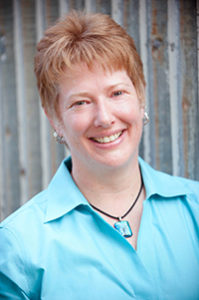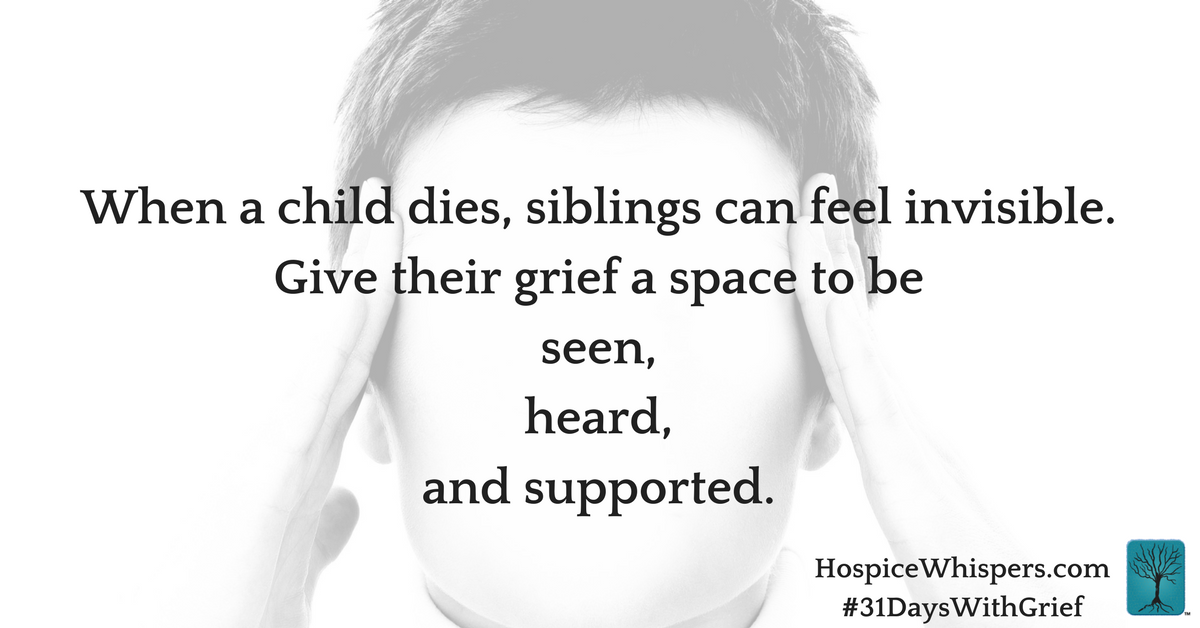31 Days of Walking with Grief: Others’ and Our Own
Day 24—Sibling Grief
This is a month-long series to support persons grieving and those who love them. It includes content from “Sharing Our Stories: A Hospice Whispers Grief Support Workbook” available through Amazon and wherever books are sold.
A friend said to me last year, “When you write your next book, PLEASE include what it’s like for us siblings. We always get left out!” So many dynamics come up around the death of a child that it can be impossible to address them all. The experience of the other children in the family often gets missed.
What it can be like…
Some siblings are close and loving. Others argue and fight. Most are a mixture of the two. If the child was a confidant or companion, that loss could be deeply felt. Losing a roommate or having your own bathroom may seem like a dream, until it comes by way of death and you’re sleeping alone in a way too quiet room. If the children weren’t close, guilt, which is already common for children to feel about a death of someone around them, may arise.
Regardless of how close they were, the sibling’s whole life has been thrown into turmoil. Parents and grandparents are distraught and often distracted, the comfort of routines and visiting with friends can disappear, new grownups are in and out of the home at all hours and the phone rings off the hook, things are happening that they just can’t understand.
Perhaps the child who died had an illness that already took time and attention away from the sibling and they resented it, or even felt relief that the turmoil around the illness and trips to the hospital and constant disruption were finally over. Either of these can prompt guilt in a sibling.
As life tries to move forward into a new normal, the child is having to adapt, as well. Sometimes, children adapt quite well. They grieve as much as they are able to in the moment and then can continue to grieve over the years as they cognitively develop and can handle more.
It can also be very hard for them to feel invisible while everyone around them grieves, and supports the parents’ grief while forgetting about the needs of the children. Siblings can feel pressure to grow up faster than usual to be more self-sufficient, emotionally and physically. They may try to make their parents feel better, and struggle when they can’t.
The vacuum left behind…
They may even try to make up for the vacuum left by their brother or sister, working to fill their shoes or fill the role they played in the family dynamic. Some parents may inadvertently put pressure on the child to do so. Feeling the incapable of being like their sibling, or even the pressure to try, can lead the child to feel incompetent, inferior, and never good enough.
One man, whose older brother died when the man was 6 years old, struggled for years with the magical thinking children can engage in to try to cope that told him if he was just good and loving and easy enough as a child, his mother would be happy again. Of course, that wasn’t rational. Of course, he couldn’t make that happen. And of course, his young mind felt responsible, and that small part remained with him for decades, until he finally dealt with it.
Siblings have has also come face to face with death in a way that most of us do not until we are much older. Being exposed to the existentially expected death of an elder is one thing. Facing the death of someone closer to our own age can leave us feeling even more threatened and insecure.
It’s jarring to realize that we aren’t immune and it really can happen to us. Blissful ignorance of threat can be adaptive, and having that illusion of safety lifted can be traumatizing in and of itself, leading to a sense of impending doom.
It never ends…
As the child ages toward adulthood, there can be a feeling that life is never allowed to be “normal” again. The cloud that comes with the death of a child in the family follows them through every meal, every trip, every holiday and gathering; their absence can’t help but be felt.
Then there are all the anniversaries of the death, when the child would have graduated, going to the weddings of the child’s friends, and on and on. The potential for triggers are constant. It is a heavy burden under which to grow up. And then to be an adult caring for aging parents without the added help the sibling may have been, yet another reason to feel put upon or abandoned.
Some do not see it that way. They find meaning in all of it that gives them hope and even a life purpose. They find comfort in the deeper perspective, wisdom, and compassion that can come from being around death and suffering.
Whatever your experience, I’m certain I’ve not comprehensively captured it here. The hope is to prompt persons to have a deeper understanding of what the experience of sibling grief might be like so we will all be less likely to ignore or miss supporting a grief that often remains faceless and hidden.
How to be present for a grieving child…
If you are around a child who’s sibling has died, here are a few quick tips to remember:
- As always, avoid cliché’s or imposing theology or meaning on a child.
- Do NOT use euphemisms like, “They went to sleep” or “on a trip” lest they freak out the next time they or a loved one gets sick or travels. Use the real words.
- Don’t force or push them to talk. Leave blank paper and colors or colored pencils around for them to draw or write. Perhaps ask them to draw a picture for their loved one or of what they think it is like for their sibling now. Invite them to write their sibling a letter. Allow them to place the picture, letter, or other tokens in the casket with their loved one if they wish.
- Children learn and process their feelings through play. They may even play “coffin” or “death”. Don’t be alarmed. This is normal as they try on what it might be like for their sibling. So long as they aren’t scaring themselves, its usually helpful.
- Don’t force anything. If the child is 5 years or older, we typically suggest allowing them to decide what they want to do about the funeral or memorial service. If they are under 5 years, parents are encouraged to make the decision they feel is best, knowing what they know about the child.
- If a child insists on being present but is denied, they can feel left out or like there is a secret happening that can be far scarier in their imagination than in reality. If they don’t want to go and they are forced, it can be traumatizing. If they do go, have a safe adult prepared to focus on them, while other grownups are grieving and distracted.
- If you know the death is coming, have a special box of toys and coloring books prepared that are new to the child. Have a grownup with whom the child feels safe prepared to focus their energy on being present with the child somewhere nearby, but out of earshot while other grownups may need space to grieve openly in a strong way that may scare the child.
- Refer questions to the parents. You’ve no idea what the parents wish to teach the child about why bad things happen or what happens after we die. Confusing the child with multiple messages is not helpful.
- Get comfortable saying, “I don’t know”. You don’t have to have all the answers.
- Don’t tell a child G-d did this, lest they learn to resent or feel afraid of a deity.
- Don’t tell the child, “You have to be extra good/strong/brave/etc.” No, the child has to be a child and grieve exactly as they need to without grownup expectations being put upon them.
- Be present, be open, don’t over-share horrific or graphic details, stay calm, and give them room to talk or be quiet or play or vent whatever emotions come up for them.
Again, this is far from a comprehensive list. Being with a sibling of a child who has died or is dying can be challenging, but the gift of simple presence can remain with that child for a lifetime, because someone refused to let them be invisible.
Trust yourself. You’ll do better than you think.
Peace,
Carla
 Rev. Carla Cheatham, MA, MDiv, PhD, TRT has served hospices as a chaplain and bereavement coordinator. She’s the Section Leader for the Spiritual Caregivers Section of the National Hospice and Palliative Care Organization and an adjunct professor at the Seminary of the Southwest. Through her Carla Cheatham Consulting Group, Carla provides training and consulting for professional caregivers nationwide. She is the author of Hospice Whispers: Stories of Life and its companion volume, Sharing Our Stories: A Hospice Whispers Grief Support Workbook. Her next book, On Showing Up with Suffering: Others’ and Our Own, is set to publish in 2017.
Rev. Carla Cheatham, MA, MDiv, PhD, TRT has served hospices as a chaplain and bereavement coordinator. She’s the Section Leader for the Spiritual Caregivers Section of the National Hospice and Palliative Care Organization and an adjunct professor at the Seminary of the Southwest. Through her Carla Cheatham Consulting Group, Carla provides training and consulting for professional caregivers nationwide. She is the author of Hospice Whispers: Stories of Life and its companion volume, Sharing Our Stories: A Hospice Whispers Grief Support Workbook. Her next book, On Showing Up with Suffering: Others’ and Our Own, is set to publish in 2017.


